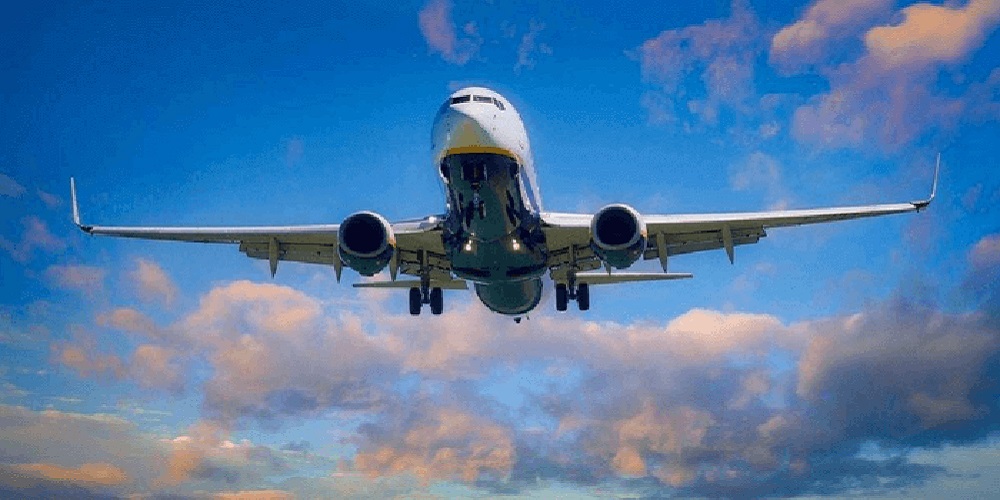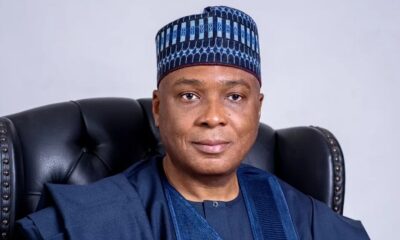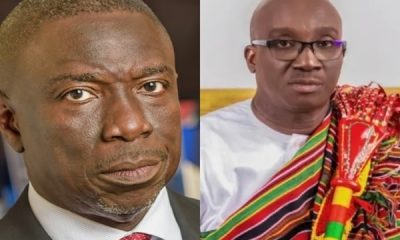Economy
Aviation authority decries flight cancellations

The acting Director General of the Nigeria Civil Aviation Authority, Chris Najomo, has expressed concern over the increasing rate of flight cancellations, saying not less than 190 flights were canceled within two months.
Najomo stated this while delivering his speech at the Airlines-NCAA engagement over the spate of flight disruptions in the country on Friday.
He disclosed that out of 5,291 flights operated in September 2024; 2,434 were delayed while 79 were cancelled.
The acting DG added that out of 5,513 flights operated in October 2024, 2791 were delayed while 111 flights were also cancelled.
He said, “Delays and cancellations are sometimes inevitable, but poor management of these disruptions is not. It is the responsibility of airlines to ensure that every disruption, whether due to operational, technical, or weather-related challenges, is handled with the utmost professionalism and regard for passengers’ rights.
“Our flight operations data record indicates that in September 2024, five thousand two hundred and ninety-one domestic flights were operated with 2,434 delays and 79 cancellations.
In October 2024 5513 flights were operated with 2,791 delays and 111 cancellations recorded.
“We must remind all operators of the NCAA Regulations on Passenger Rights during disruptions, as outlined in the Nigeria Civil Aviation (Consumer Protection) Regulations, 2023. These regulations are not optional; they are mandatory obligations.”
Speaking at the sideline of the event, Najomo also stated that he had been receiving phone calls from the presidency and members of the National Assembly over the unruly behaviours of passengers at the airport, mostly occasioned by flight disruptions/ cancellations, describing such as an embarrassment to Nigeria.
This was as the NCAA boss insisted that no stone would be left unturned in tackling the menace and restoring the sanctity of the Nigerian airports.
While asking the airlines to tidy their end of the air transport bargains, Najomo promised to meet with the Federal Airport Authority of Nigeria after which a fresh decisive decision on how to better tackle the development would be made.
He said, “The unruly behaviour of some passengers is fast becoming very disturbing, I am getting calls from the presidency and even the National Assembly. This unruly behavior is not good for our image as a country and we are resolute in putting a stop to it.
The aviation regulator who understood that flight cancellations and disruptions were mainly responsible for the unruly behaviours of passengers at the airports insisted that violence should, however, not be the next resolution.
Also expressing her dissatisfaction with the trend of unruly behaviours, the Managing Director of the FAAN, Olubunmi Kuku, said the agency was disturbed about the development at the airports.
Kuku said, “I have continued to harp on communication and engagement with the NCAA, FAAN, and the Airline Operators of Nigeria. I have also enjoined operators to ensure that they provide us with the right information.
“We have continued to tell the passengers to ensure that they provide their email addresses to the airlines so they can get information but if you do act like a criminal within the terminal building, you would be treated as one. We understand the plight of passengers but to start behaving in a manner that is demeaning to airline staff or the airport, we would prosecute or even put you on a no-flight list.”
Economy
More Nigerians to experience poverty by 2027 – World Bank

The World Bank’s latest Africa’s Pulse report has projects a grim future for Nigeria, with poverty expected to rise by 3.6 percentage points by 2027.
Released during the IMF and World Bank Spring Meetings in Washington, DC, the report cites Nigeria’s reliance on oil, economic fragility, and governance challenges as key drivers.
It highlights the country’s structural economic weaknesses, dependence on oil revenues, and national fragility as key barriers to meaningful poverty reduction.
“Poverty in resource-rich, fragile countries, including large economies like Nigeria and the Democratic Republic of Congo, is projected to increase by 3.6 percentage points between 2022 and 2027,” the report stated.
Despite recent growth in Nigeria’s non-oil sector during the last quarter of 2024, the World Bank warns that this progress is unlikely to translate into widespread poverty alleviation due to ongoing fiscal and institutional challenges.
The report emphasizes that Sub-Saharan Africa remains the world’s poorest region, with an overwhelming 80% of the globe’s 695 million extreme poor residing there in 2024.
Within the region, half of the 560 million extremely poor people were located in just four countries, including Nigeria.
In stark contrast, South Asia accounted for 8% of the world’s extremely poor population, East Asia and the Pacific 2%, the Middle East and North Africa 5%, and Latin America and the Caribbean 3%.
The World Bank attributes the rising poverty in Nigeria and similar economies to weakening oil prices and fragile governance structures, noting: “This follows a well-established pattern whereby resource wealth combined with fragility or conflict is associated with the highest poverty rates, averaging 46% in 2024, which is 13 percentage points higher than in non-fragile, resource-rich countries.”
Meanwhile, non-resource-rich countries in Africa are experiencing stronger economic growth and faster poverty reduction, buoyed by high agricultural commodity prices and more resilient fiscal policies.
To reverse Nigeria’s downward poverty trend, the World Bank recommends reforms that prioritize inclusive economic growth and stronger public financial management.
It calls on the government to focus on “improving fiscal management and building a stronger fiscal contract with citizens to promote inclusive economic development and long-term poverty alleviation.”
Economy
SEE current exchange rate of the Dollar to Naira

What Is the Dollar to Naira Exchange Rate at the Black Market (Aboki FX)?
Here is the Dollar to Naira exchange rate at the parallel market, popularly known as the black market (Aboki fx), for Tuesday, April 23, 2025.
You can exchange your dollars for naira at the following rates:
Black Market Exchange Rate (Lagos – April 23, 2025):
According to sources at the Bureau De Change (BDC), the exchange rate at the Lagos parallel market saw traders buying at ₦1610 and selling at ₦1620 per US dollar.
It’s important to note that the Central Bank of Nigeria (CBN) does not recognize the black market. The CBN advises individuals seeking foreign exchange transactions to do so through their banks.
Dollar to Naira Exchange Rates
Market Type Buying Rate Selling Rate
Black Market ₦1610 ₦1620
CBN Official Rate ₦1591 (Low) ₦1606 (High)
Note: Forex rates vary across dealers and regions, and actual rates may differ from those listed.
Meanwhile, the Nigeria Customs Service (NCS) has announced the seizure of 298 smuggled items worth ₦7.6 billion between January and March 2025. The NCS also disclosed that it generated a total revenue of ₦1.75 trillion in the first quarter of the year.
Economy
Volvo announces termination of 800 U.S. workers, cites tariff, market decline

Volvo Group has announced plans to lay off up to 800 workers at three of its U.S. facilities over the next three months, citing ongoing market uncertainty and declining demand exacerbated by tariffs introduced under the administration of President Donald Trump.
The affected locations include the Mack Trucks plant in Macungie, Pennsylvania, as well as Volvo Group sites in Dublin, Virginia, and Hagerstown, Maryland.
In a statement on Friday, Volvo Group North America confirmed that between 550 and 800 employees would be impacted.
The company, a subsidiary of Sweden’s AB Volvo, employs nearly 20,000 people across North America.
The layoffs come amid wider turmoil in the automotive and manufacturing sectors, as shifting U.S. trade policy and a series of tariffs continue to drive up production costs. Economists have pointed to the uncertainty surrounding Trump’s trade strategy as a factor undermining both business and consumer confidence, with concerns mounting over a potential economic slowdown or recession.
According to Volvo, the company is grappling with a decline in heavy-duty truck orders, driven by instability in freight rates, anticipated regulatory changes, and the growing financial burden of tariffs. “We regret having to take this action, but we need to align production with reduced demand for our vehicles,” a company spokesperson stated in an email quoted by Reuters.
Volvo’s announcement marks another blow to an industry already navigating a complex web of supply chain challenges and fluctuating market conditions, with other manufacturers also warning of potential cost hikes and disruptions tied to global trade disputes.
-

 Economy13 hours ago
Economy13 hours agoMore Nigerians to experience poverty by 2027 – World Bank
-

 News8 hours ago
News8 hours agoOborevwori /Okowa: PDP experiencing a rebirth and will soon bounce back-Saraki declares
-

 Politics13 hours ago
Politics13 hours agoLabour Party reaffirms Abure-led leadership after Supreme Court judgment
-

 News13 hours ago
News13 hours agoGovernor Oborevwori’s Defection: A Masterstroke That Handcuffs Delta’s Opposition
-

 News5 hours ago
News5 hours ago2027: Pro-Fubara protesters want suspended Gov to run as Atiku’s VP(Video)
-

 News13 hours ago
News13 hours ago2027 done deal, more governors joining APC – Ganduje declares
-

 News6 hours ago
News6 hours agoEdo poll: How APC allegedly offered witnesses N30m bribe
-

 News13 hours ago
News13 hours ago2025 UTME begins at CBT centres nationwide


















